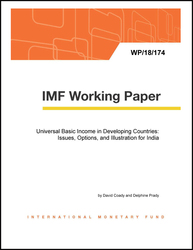
Universal Basic Income in Developing Countries: Issues, Options, and Illustration for India
This paper discusses two common arguments for the adoption of a UBI; that it can be a more effective way of supporting low-income households when existing safety net programs are inefficient, and that it can generate broad support for structural reforms. Using India as an illustration, the paper discusses the trade-offs that need to be recognized in adopting a UBI in these contexts. It shows that replacing the 2011 Public Distribution System (PDS) with a UBI results in losses for many low-income households, although much of this can be reduced by recycling the “out-of-system” PDS losses and the fiscal savings from excluding the highest-income groups as higher UBI transfers. In contrast, replacing inefficient energy subsidies—raising energy prices to efficient levels to internalize the negative environmental externalities of energy consumption—could simultaneously deliver unambiguous distributional gains, help address fiscal pressures, and improve energy efficiency with associated environmental and health gains. Implementing such reforms would, of course, require careful communication and implementation to address political barriers to reform.
Publication date: July 2018
ISBN: 9781484370049
$18.00
Add to Cart by clicking price of the language and format you'd like to purchase
Available Languages and Formats
| English |
Prices in red indicate formats that are not yet available but are forthcoming.
Topics covered in this book
This title contains information about the following subjects.
Click on a subject if you would like to see other titles with the same subjects.
Universal basic income , safety net reform , efficient energy pricing , distributional gains
Summary
Copyright © 2010 - 2024
Powered by:
AIDC



